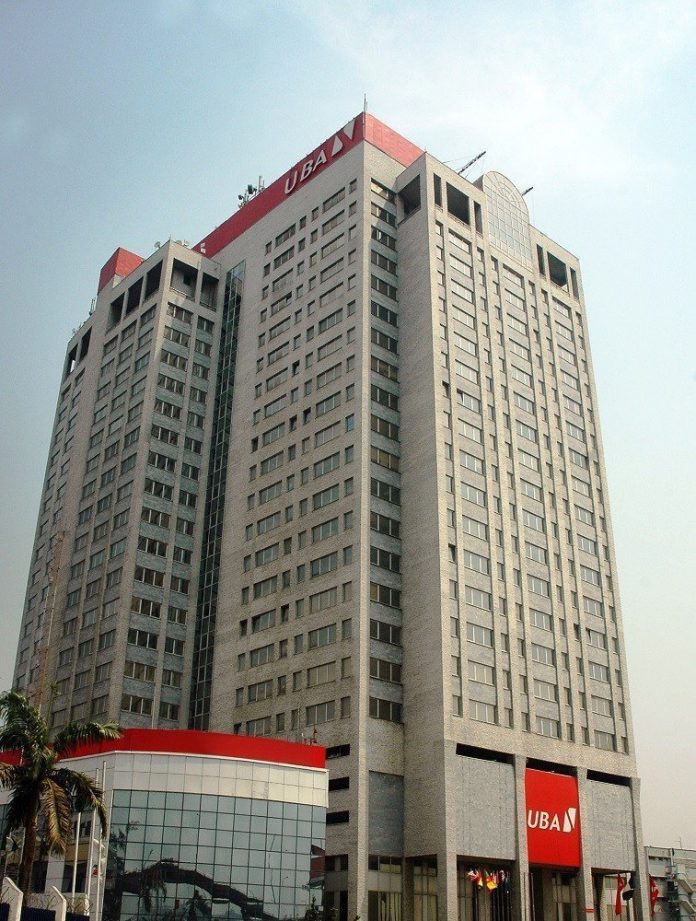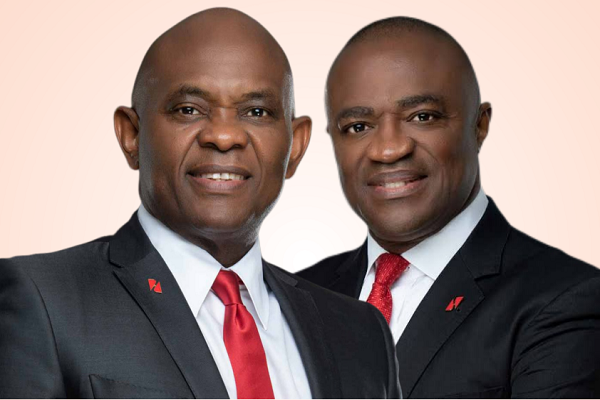United Bank for Africa (UBA) Group is a standout example of one of the most thrilling success stories of financial services institutions in Nigeria. It has clearly realized its vision statement, which is: “To be the undisputable leading dominant financial services institution in Africa” with presence in 20 African countries – the highest such feat of any bank of African origin.

UBA has become one of the longest surviving banks, one of the most secure, with one of the highest number of customers, and having one of the widest branch and operational outlets among Nigerian banks. It is also one of the most capitalized. The UBA Group, now a global brand, addressed a global press conference on Monday, May 20, at its Lagos headquarters to kick-start activities marking its 75th anniversary. The celebration will last for the rest of the calender year.

At 75 years of existence, UBA Group has come a long way in financial service delivery in Africa and beyond. It began operations in 1949 as then British and French Bank Limited (BFB), and was later incorporated as a limited liability company in 1961. United Bank for Africa, has been through thick and thin of banking revolutions, reforms and metamorphoses, in the last seven decades and half of operations. This journey has not been without turns and crossroads, like every adventurous voyage.
Today, UBA has evolved into a global financial institution with a presence in 20 African countries and 4 global financial nerve centres (New York, London, Paris and Dubai). It has over 25,000 staff, over 35 million customers served through multiple channels – over 350,000 POS terminals, 2,000 ATM terminals, 1,000 business offices and 19.7 million card customers.
“This milestone is not just a celebration of longevity, but a testament to resilience, innovation, and unwavering commitment to excellence that have defined UBA’s journey over the decades,” Oliver Alawuba, the Group Managing Director, told the press. “As we reflect on the significance of this epoch-making event, it is important to acknowledge that UBA means different things to different people. For some, UBA is a trusted financial partner; for others, UBA is a beacon of stability and reliability, a development partner in various local communities as well as a catalyst for African development.”
“Amidst economic challenges and market dynamics, UBA has demonstrated remarkable financial strength and resilience. Its splendid performance, especially within the last year, is a testament to the robust fundamentals and sound strategic decisions taken by the bank,” Alawuba said.

Like every corporate entity, UBA has recorded both low and high moments but its promoters have consistently fixed their eyes on the ball and remain guided by the vision of its founding fathers. United Bank for Africa was one of the most iconic banking brands of the 70s and 80s. In the mid 80s, UBA came up with one of its most timeless advertising and promotional classics, ‘Wise men Bank with UBA.’ Immediately this campaign hit the airwaves, there was a backlash as the Bank was accused of male chauvinism by claiming that only wise men were banking with UBA. ‘What of women?’ A newspaper columnist asked famously.
The furore brought the best out of those managing the UBA brand then. They didn’t drop the iconic material. They simply went back to the production laboratory to rework the material with more attention and delivered an arresting copy: “Wise men bank with UBA. And women too with UBA. Save your counts and your money with UBA.” That was it.
The turning point in the bank’s history occurred in 2005 during the Nigerian banking consolidation supervised by then Charles Soludo-led Central Bank of Nigeria (CBN), which saw the merger of the United Bank for Africa and defunct Standard Trust Bank (STB) which gave birth to the UBA Group.
This historic development saw Tony Elumelu, the then Chief Executive Officer of STB and the brain behind the corporate martiage, emerge as the new Chief Executive Officer of the reinvigorated financial institution. At 34 years of age, Elumelu was already the youngest Chief Executive Officer in Nigeria. So he was not new to taking on big responsibility and executing herculean leadership roles, albeit excellently. He displayed this dexterity by navigating the complexities of the merger and leading one of the biggest financial institutions in Africa.

With Tony Elumelu at the driver’s seat, coupled with his eagle-eyed focus on the vision statement of UBA, he began a bullish run in the bank which saw its branches grow exponentially across Africa and beyond. His ten-year stint as CEO of UBA Group positioned the bank as one of the leading financial institutions in Africa, aligning with its mission statement: “To be a role model for African businesses by creating superior value for all stakeholders, abiding by the utmost professional and ethical standards, and by building an enduring institution.”
UBA, with over seven decades of experience in retail and corporate banking, innovative cross-border payments, trade finance and investment banking, has been on the trajectory of progress in the last seventy-five years of operations. Its core values are etched on Enterprise, Excellence and Execution.
With the strength it gained from the merger, the brand came up with another iconic advert material, the ‘World in Your Pocket Campaign.’ This was conceptualised to subtly announce to the banking public that UBA has become a global brand. In the campaign, a suave-looking corporate personality was showcased while bestriding the corporate world with confidence because he has UBA as a partner.
At the global press conference, Alawubahonoured the past leaders of the bank for their steadfastness. He poured encomiums on Elumelu, the current Group Chairman, especially, for his sacrifices, contributions, support and guidance over the years. He said: “We appreciate and honour you because you built and nurtured the platform on which we are standing today. Our Group Chairman truly deserves special recognition and mention.
“Without his visionary push in 2005 and tutelage over the years, I doubt whether we would be where we are today. For these and more, we say a big and resounding thank you to him.”
On his part, the Group Chairman looks at the bank’s past with pride. Elumelu, who established STB in 1997, admitted during a recent reunion event of the old STB team that he came in with the youthful brand at the time to redefine the face of banking in Nigeria.
“As CEO of STB, I wanted to challenge the status quo and democratise access to banking in Nigeria – and then Africa. What was a dream, quickly became a reality. The symbol we chose – the mustard seed – as the logo of UBA, has truly borne fruit,” he said while welcoming old colleagues to the reunion.
He admitted that achieving what he targeted was not easy and that the STB Lions and Lionesses, as the alumni of STB call themselves, worked day and night to execute that vision. According to him, these successes laid the groundwork for the largest financial services transaction in Africa to date, the merger of STB and UBA Group in 2005.
As the UBA Group and its global stakeholders celebrate its 75th anniversary in the coming months, they’ll be proud of the milestones which the financial services giant has attained. Ten of them include:
1. Making the name, ‘United Bank for Africa,’ count
Perhaps the number one milestone, the factor that has continuously worked for the brand is its name -United Bank for Africa. True to its name, UBA became stronger as a real bank of destiny, following the banking industry consolidation between 2004 and 2005, which changed the dynamics of banking in the country.
The name played a bigger role and claimed its destiny of pan-Africa nomenclature at the time other leading Nigerian banks were making inroads into other African countries. From Ghana to Cote d’lvoire, Cameroon to Congo DRC, down to Gabon, UBA’s natural identity opened doors with ease. This could not be said of other brands that struggled and deplored huge campaigns to tell customers in their new markets that the brand they brought was pan-African. Thus, UBA has demonstrated over the years that names are an incredibly important part of brands’ identity because they carry deep cultural, familial, and historical connections.
2. Perfect marriage of the Old and the New banking traditions
UBA has been able to combine age with modernism that warmed into the minds of its customers. Many analysts have linked the youthfulness and modernism of the brand to the 2005 marriage between the old UBA and the then Standard Trust Bank (STB), which appeared to target the youth and students market more than any of the then existing banks in the country.
The ability of the bank to reinvent itself played out pointedly during its merger with STB. While UBA was facing challenges then, it was generally believed that it was a stronger brand than the then STB. And that was why it was agreed that the name ‘UBA’ must be retained in the new brand after the merger but adopted the ‘STB’ logo -the mustard seed – in front of the name ‘UBA.’ This ‘perfect union’ has helped to foster brand loyalty from generation to generation. Alawuba, the Group Managing Director/Chief Executive Officer, has placed the value of this milestone in a clear context when he said: “You meet several people, they will tell you that they are third or fourth generation of UBA customers in their families, that their grandparents and parents were customers of UBA and their children currently carry UBA ATM cards, enrolled on our mobile banking and LEO chatbot banking. This is the strength of UBA.”
3. A harvest of ‘firsts’ in bankning in Nigeria and Africa
At 75, the story of UBA is that of stability and excellence which has earned it a harvest firsts in many areas. The bank was the first bank in Nigeria to offer an initial public offering (IPO) in 1970, the first Nigerian bank to be listed on the Nigerian Stock Exchange, NSE, (now Nigerian Exchange Limited (NGX).
It was also the first bank of African origin in the USA and UAE and the first bank in Nigeria to install Automated Teller Machines (ATMs) and open a campus branch at the University of Lagos in Nigeria.
UBA was the first Nigerian bank to open a subsidiary in Africa (Ghana in 2005). It appointed the first female board chairperson in Nigeria and was a pioneer in introducing mobile banking in Nigeria. It also launched the first multi-lingual chatbot banking in Nigeria called Leo as well as the first Nigerian bank to launch the most successful prepaid cards across Africa.
4. Leader in the provision of technology-driven services in Africa
UBA is a leader in the deployment of technology and innovation in the provision of banking services in Africa. The banking conglomerate pioneered automated and mobile banking in Nigeria. It now has over 350,000 Point of Sale (PoS) terminals, 2,000 ATM stations, 20 million cardholders, 1000 business offices.
The Executive Director/Chief Operating Officer, UBA, Alex Alozie said that the bank invests in cybersecurity to ensure customers’ funds are safe. He explained: “Serving 45 million customers means that you must have enhanced technology and at the same time have the technology that can also prevent fraud.
“What we have done across Africa is to ensure that we have technology that connects one country to another. With UBA technology you can transfer money from Ghana to Togo, from Ghana to Kenya without coming into the bank.
“What we have done with technology and in terms of fraud is to empower our customers to know that we have that underlying technology that will prevent customers from losing funds and today UBA is a safe haven for customers’ funds.”
5. Nigerian Bank with the largest global presence
The vision statement of UBA is: “To be the undisputable leading dominant financial services institution in Africa.” True to that vision, the group is today one of the banks in Africa with the network of operational outlets spread across the highest number of countries in the continent. UBA’s extension to Uganda in 2008 marked the establishment of its first subsidiary in the East and Southern Africa Region which exemplified the bank’s commitment to growth and development. As UBA Uganda celebrates 16 years of operation, the Group has extended its branch network across the major regions countrywide like in the Central, East, West and North. In the African continent, it has presence in 20 countries.
“Our market share in those countries is improving. In fact, if you go to some of the countries, UBA is the number one, number two, number three bank in these countries and some of them are appreciating the contributions of UBA to the economy, which have been very impactful,” Alawuba said. The good news from the Group Managing Director is that “all the subsidiaries in Africa are profit-making and all of them are contributing more than 50 percent of the gross income of UBA and this trend will continue. So, the vision of going into these countries is paying off and we will continue to invest in Africa.
6. Bank with one of the largest deposit bases
UBA’s depositors’ funds has now hit a record N18 trillion with about 35 million customers across African countries. The Group Managing Director said: “Today, you will see that our customer base is moving up to 45 million customers across Africa and these are growing on a daily basis..”
7. Bank with one of the widest branch networks and operational bases in Nigeria
With 460 branches across Nigeria, UBA sits comfortably as the third bank with the most branches in the country. This, coupled with its pioneering efforts in the provision of technology-driven financial services, has extended the democratisation of financial services to new frontiers in Nigeria.
8. One of the most capitalized banks in Nigeria
On January 15, 2024, on the Nigerian Exchange Limited (NGX), UBA’s shares traded at N29.90, pushing its market capitalization to an impressive N1,022,562,698,843. This ascent catapulted the bank into the ranks of the top three most capitalized financial institutions in Nigeria, showcasing an extraordinary leap from N283.8 billion at the outset of 2023. It also earned the bank a remarkable milestone by joining the exclusive group of companies with a market capitalization exceeding N1 trillion. The rise in market capitalization reflects a rising share price, which translates to potentially greater returns for shareholders through capital appreciation and dividends, according to analysts.
“Reaching this milestone signifies strong financial performance and stability, potentially attracting more investors and boosting the bank’s reputation,” a Lagos-based investment analyst said.
For customers, the stronger financial position enables UBA to invest in better technology, infrastructure, and human resources, potentially leading to improved customer service and product offerings. Furthermore, the milestone reinforces UBA’s stability and financial strength, potentially contributing to increased customer trust and confidence in using the bank’s services. UBA’s achievement sets a new benchmark for other Nigerian banks, potentially spurring them to improve their performance and efficiency to compete effectively.
9. Leadership in supporting SMEs
Another UBA’s milestone is the leadership the Group has been providing in the financing of Medium and Small Enterprises (SMEs) in Africa. It has earmarked $6 billion for this purpose.
“We don’t just support these businesses,” Alawuba explained,”we support all the value-chain that are tied to these businesses so that the SMEs will continue to thrive. SMEs are the future of Africa and will continue to provide support to SME businesses.”
The Group Managing Director said UBA’s vision is to be the role model for African businesses. “UBA is one bank, uniting Africa while connecting Africans to the world and the world to Africa. Our primary focus is to be the payment bank for capital flows, trade and investments between Africa and the rest of the world.
“We are committed to expanding our presence, seizing growth opportunities, and delivering value to all stakeholders. Collaboration and partnerships as exemplified by the $6bn SME funding agreement signed with the African Free Trade Area (AfCFTA) will be instrumental in achieving our strategic objectives. We are dedicated to deepening relationships with customers, employees, regulators, and other stakeholders for mutual benefit and long-term success.”
10. Filling the infrastructure gap in Africa
UBA focuses on the countries where it operates, supporting the key sectors that drive their economies. These include the agricultural sector, telecommunications, power sector, and the construction of roads and ports.
“The infrastructure gap in Africa is a lot but there lies the opportunity that we have in Africa,” Alawuba said. “In some of the countries, we have done a lot in terms of road infrastructure support, building of ports, and improving the capacity of ports in taking goods. In some of the countries, we have even done as much as dealing with stadiums. In some of the countries, some of the stadiums where the matches of AFCON was played, were actually supported by UBA.
In some, UBA has built their capacity for revenue generation in terms of technology, to ensure that the governments have enough funding to support the business of the day.
“Today, we are supporting mining in several countries in Africa. We are supporting cotton. We are supporting cocoa. We are supporting cashews in several countries, depending on what the country is built on.”
“Our market share in those countries is improving. In fact, if you go to some of the countries, UBA is the number one, number two, number three bank in these countries and some of them are appreciating the contributions of UBA to the economy, which have been very impactful.”
According to the GMD, Africans are doing less with each other and more with others hence, the need to encourage inter-Africa trade.
“So it will be easier for you, a manufacturer in Nigeria, to find a market in Ghana, or a Ghana manufacturer to find a market in Senegal. You need a bank that will put all this together and that is what UBA is doing,” he said, disclosing that the bank was collaborating with various partners to enhance inter-African trade in the coming years.
The future
As it celebrates its 75th anniversary, UBA is looking into the future with confidence. It has promised to continue to deepen innovation and prioritize customer service. Alawuba restated the institution’s commitment to innovation and digital transformation to enhance customer experience and drive operational efficiency.
The bank has also underscored its dedication to corporate social responsibility and its role in facilitating trade and investment between Africa and the rest of the world.
“I would like to reiterate UBA’s commitment to Customer First Philosophy, which is our primary business strategy,” he said. “We will continue to invest in innovative products, services, and digital platforms that enhance customer experience and drive operational efficiency.”
According to him, the bank would over the next years focus on increasing its presence in the countries where it currently operates, adding that the bank will also focus on supporting small and medium scale enterprises (SMEs).
The bank is also confident of meeting the deadline set by the Central Bank of Nigeria for raising their minimum capital to N500 billion. The bank’s Executive Director, Finance and Risk Management, Ugochukwu Nwaghodoh said: “For UBA, we operate with the highest license available, which is an international license. We have operations, very strong backgrounds, operations across Africa, and indeed, in several centers in the world.
“So we’ve chosen this route and we are looking at options; we have engaged financial advisors. We indeed have set in motion the requisite approvals from the shareholders. So on Friday, hopefully, we will be receiving the approval of shareholders on certain resolutions that will enable us to execute the required capital raise. We are committed to achieving this well ahead of the deadline.”






